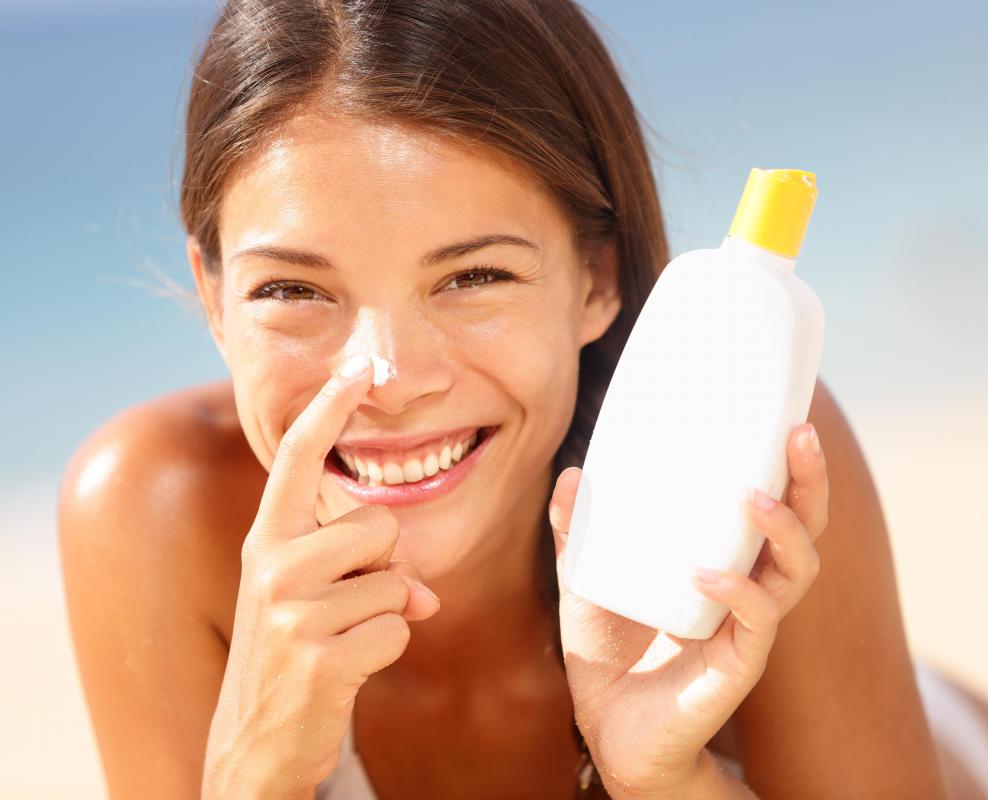At TheHealthBoard, we're committed to delivering accurate, trustworthy information. Our expert-authored content is rigorously fact-checked and sourced from credible authorities. Discover how we uphold the highest standards in providing you with reliable knowledge.
What Is an Ephelis?
Ephelis is a medical term of Greek origin that means freckle. A freckle itself is a flat, round and tan spot that appears on a person’s skin, most commonly on the cheeks and nose, as well as the arms and upper shoulders. In general, there are two different types of freckles — simple and sunburn. When a person is talking about an ephelis, he is referring to a simple freckle, as a sunburn freckle is called a lentigo. While there are many differences between an ephelis and a lentigo, the main physical characteristics of an ephelis are that it is usually lighter and smaller than a lentigo.
People with light hair and fair complexions are those who most commonly acquire ephelides. Ephelides can vary in color, but in general, they are darker than the surrounding skin. A person who acquires ephelides might discover that he or she tends to form them in multiples. They appear during sunny weather and can lighten during the winter. In some cases, the appearance of ephelides is a genetic trait.

In contrast to ephelides, lentigines usually appear due to sunburns, on the backs and upper shoulders, which are both areas where people get sunburned the most. As well as being darker and larger that ephilides, lentigines also tend to have more irregular borders. In addition, these types of freckles do not form in multiples but singularly and in isolated areas. Also, lentigines do not fade during the winter.

Although freckles might form as a result of genetics or a few medical conditions, they also appear as a result of repeated sunlight exposure; that is, a person often acquires freckles due to exposure to ultraviolet (UV) radiation. When a person is exposed to UV radiation, melanocytes, which are pigment-producing cells, increase the production of the pigment melanin. This increase in melanin is what results in freckles. The amount of freckles that forms varies from person to person, depending on genetics and susceptibility to UV radiation. For example, two people who receive the same amount of UV radiation will not necessarily receive the same amount of freckles.

Since freckles are usually harmless, treatment is not necessary. For cosmetic reasons, though, there are a couple of methods that can help prevent freckles from appearing. Avoiding the sun and using sunscreen might help reduce the appearance of freckles. In addition, there are also treatment methods that help lighten freckles. These methods include chemical peels, cryosurgery and laser treatment.
AS FEATURED ON:
AS FEATURED ON:















Discussion Comments
@Azuza - I read the "Anne" books as a child also. If I recall correctly, her freckles lightened up a bit when she was an adult. Perhaps she had a combination of a few different types of freckles, ephelis freckles included.
I think modern freckle removal techniques are a bit more effective than the technique Anne tried. I actually have a friend that had a chemical peel in hopes of lightening her freckles. It worked really well, but I don't think it was strictly necessary!
I get ephelis freckles depending on how much time I spend in the sun during the summer. I normally get them on my nose. Honestly, I wish they would stay all year round, because I think they are cute. I think they add a little bit of character!
I know not everyone feels this way. In fact, whenever I think of freckles I'm always reminded of Anne from the "Anne of Green Gables" books. She is a red-head with tons of freckles, which she of course hates.
In one of the books, she attempts to lighten her freckles with some sort of solution. Instead of lighting her freckles it turns her whole nose a different color!
I've got both kinds of freckles, ephelis and lentigines. I was sunburned a lot as a kid, so that explains the lentigines I guess.
And my mother was Irish, so I've always had a tendency to freckle. I do mostly only have them on parts that are usually exposed to the sun, like my arms and face.
Actually, the lentigines are the ones that can be quite scary sometimes, as with an irregular shape, I'm often worried they might be cancerous. You have to watch them to make sure they don't change.
The ephelis types are pretty innocuous.
I actually quite like the look of them, most of the time. They make me look unique.
I hated my freckles when I was a kid, although thinking back now I'm sure they looked a lot cuter than I thought!
Now I don't seem to have nearly as many. I think this is partly because I use sunscreen as much as possible, to prevent skin damage.
It might also be because I had some laser hair removal and that apparently will help to remove freckles from your skin as well. The pigment kind of crusted up a little bit and when it fell away, the freckles underneath were much paler.
I have to say, I don't miss them much! Although I still have freckles all over my arms to remember them by.
I don't remember how old my son was when he began getting his first freckles. I know that he was pretty young as I remember many people commenting on them.
The older he has gotten, the more freckles he gets on his face. He has never been bothered by them as they are not real dark.
I didn't realize there were different types of freckles, but his are definitely ephelis freckles, because he has them whether he is out in the sun or not.
Post your comments